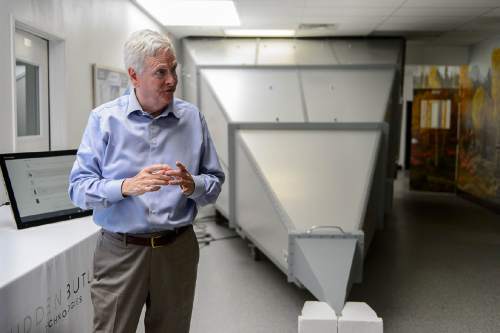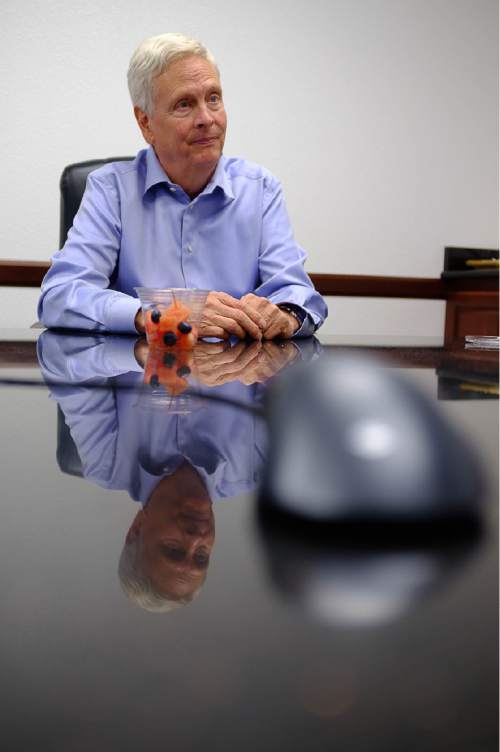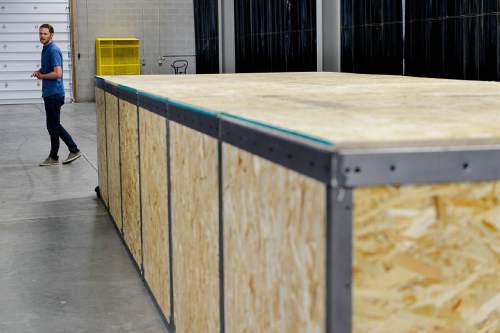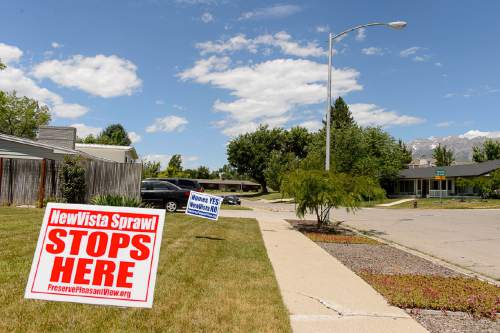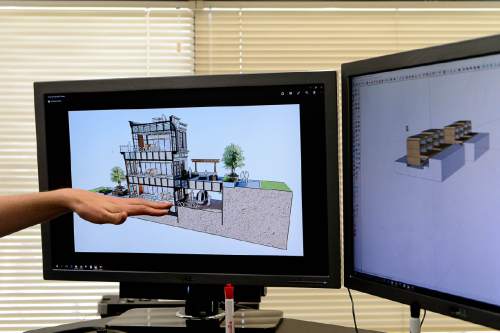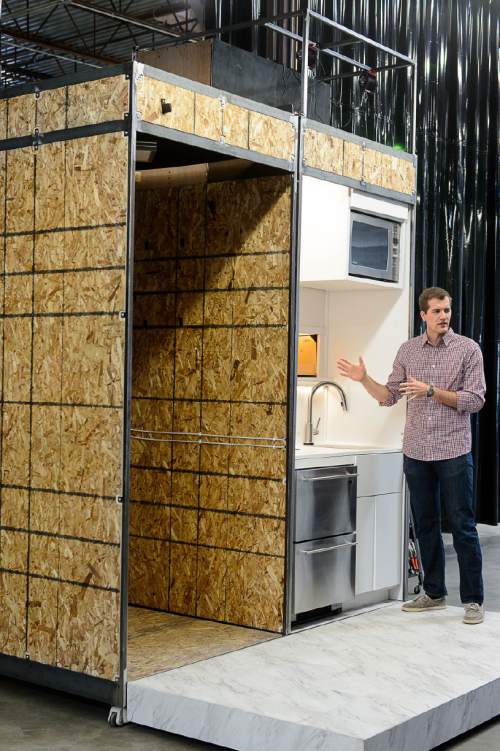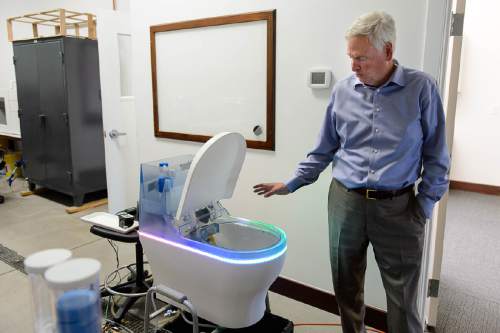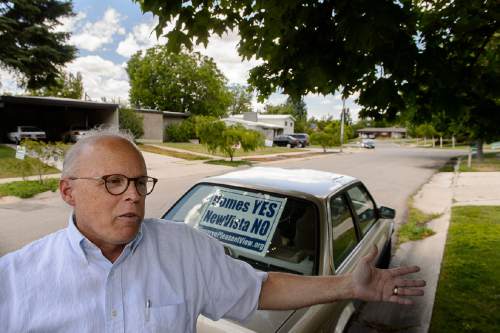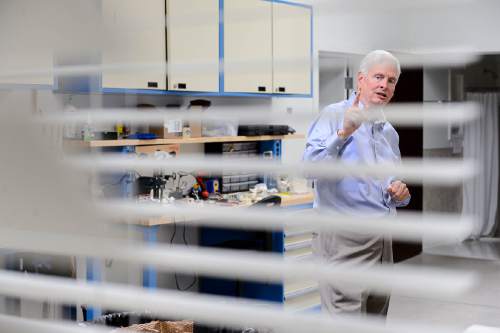This is an archived article that was published on sltrib.com in 2016, and information in the article may be outdated. It is provided only for personal research purposes and may not be reprinted.
Provo • Residents of a quiet Provo neighborhood are fighting one man's dream of buying and tearing down their homes to make way for a radically compact, eco-friendly community inspired by the visions of Mormon founder Joseph Smith.
David Hall, a 69-year-old LDS businessman and heir to a family business in synthetic-diamond making, has devoted much of his wealth to solving engineering challenges to making key parts of Smith's 1833 Plat of the City of Zion a reality.
Through Hall's NewVistas and its many subsidiaries, the silver-hair entrepreneur has bought nearly 20 homes in Provo's Pleasant View neighborhood, according to property records — often paying sellers a considerable premium. He owns about half the lots already and continues to buy.
"I totally intend to die broke," Hall joked during a recent tour of busy research laboratories in his southern Provo industrial park.
He views his NewVistas project as pioneering a revolutionary break with past generations of unregulated residential growth and wasteful commuting patterns.
As neighbors grow apprehensive, Hall speaks openly about his hopes to one day acquire the whole Pleasant View subdivision and clear the land to build a highly dense and techno-centric colony-turned-social experiment, packing up to 20,000 residents into a single square mile.
"The concept of single-family homes is an urban-sprawl disaster," Hall said. "Let's bring food, industry, commerce, education, play — everything together so we can walk. Our cars can be simply something that we use occasionally instead of every day."
Neighbors will hold a rally Thursday against his plans at 6:30 p.m. at the corner of Lambert Lane and 500 East in Provo. Hall, meanwhile, has scheduled a simultaneous public reception nearby at the Tracy and Ida Rose Pavilion.
Resident Rebecca England, whose 82-year-old mother lives in Pleasant View, called Hall's plans "bizarre" and said they have left tight-knit residents "bewildered and distraught."
"So many red flags and unanswered questions," England said. She and others are urging Hall to put homes he owns back on the market and abandon his utopian blueprint.
R. Paul Evans, head of the Pleasant View Neighborhood Council, said NewVistas has cast uncertainty over homeowners who bought there, expecting it to remain a placid enclave of single-family homes.
Thursday's rally, he said, is meant to garner support across Provo and the state to counter Hall's vision for what Evans called "corporate living."
"We're saying, 'OK, you may have picked up some homes here and there, but your progress in the future is going to be adamantly opposed,' " Evans explained. "We can either succumb to these pressures, or we can say, 'We're better than this.' "
Hall said his NewVistas community is an idea whose time has come as the planet's dwindling resources and trends such as climate change force sustainability questions.
"Let's be honest about our sprawl," he said. "I just want discussion."
Among NewVistas' watchwords: small, local, decentralized. Families of all kinds, Hall said, would occupy the community's carefully designed and adaptable work-live-play spaces, equipped with sophisticated movable fixtures and utilities akin to modular Swedish furniture maker IKEA on steroids.
Residents would give up ownership of private property, by and large, and have about 200 square feet of private space apiece, while sharing ample green spaces, basketball courts, swimming pools and other communal areas.
"No matter how rich you are," Hall said, "you can't own more space."
And even though the community is inspired by ideas from the first prophet of The Church of Jesus Christ of Latter-day Saints, NewVistas would need to be demographically diverse, Hall said, "or it will not succeed."
NewVistas' 150 engineers, scientists and technicians are pursuing more efficient building materials, hypermodular dwelling designs, soundproofing for shared walls, low-water LED toilets tied to on-site waste-treatment facilities and new techniques for high-yield food production.
The 25 companies under NewVistas' umbrella also are filing hundreds of patent applications, records show, as Hall spins off startup after startup built around new sustainable technologies. He recently sold a family oil-and-gas-drilling technology firm called Novatek and is plowing the cash into NewVistas.
"I'm generating wealth galore," he said, "and that makes people mad."
Some residents are, indeed, angry, though Evans said "their reactions are as diverse as Mr. Hall's vision is monocultural."
Hall "insults his former neighbors by gloating and saying he knows what's best for everyone and has the money to make it happen," England said, "no matter the opposition."
Neighborhood activists say they've formed an alliance with anxious residents in rural Vermont, where Hall has snatched up more than 2,000 acres near Smith's birthplace of Sharon. Hall said he wants to acquire up to 3,000 more acres in Vermont, with the same community-building in mind.
In the interim, Hall is considering a small model community of about 100 residents and an experimental hotel in his industrial park along southern Provo's Mountain Vista Lane to test-drive his ideas.
And once the first NewVistas community is up and thriving, Hall said he intends to build more, eventually cobbling multiple diamond-shape towns together as per Smith's handwritten note in the margins of the Plat of Zion to "fill up the world."
Hall grew up in Pleasant View but said he chose that area for his grand plan because of its proximity to Brigham Young University and the LDS Church's Missionary Training Center — job centers that make it an ideal locale for proving NewVistas' concepts of walkability.
Building in Vermont may be a generation or more away, but Hall said designs for Pleasant View could be realized within 10 to 15 years — assuming he can persuade Provo officials to rezone the subdivision.
For now, that approval seems unlikely. City Council members are siding with preserving the Pleasant View neighborhood as is, calling it part of Provo's history and character.
In a statement of support to be read at Thursday's rally, Councilwoman Kim Santiago said neighborhoods of single-family homes in Provo need to be "protected like an endangered species."
But residents cannot rule out that Hall may scoop up enough homes to swing politicians his way. They say they are recruiting "anchor" Pleasant View homeowners who will refuse to sell. Others say Hall should find Utah County sites better suited to his experiment — a suggestion he rejects.
While Hall considered locating his community on open ground farther south, in Payson, he said, such options miss a crucial point.
"We've consumed enough space," Hall said. "Let's take the space we have used already and redo it."
Twitter: @TonySemerad


